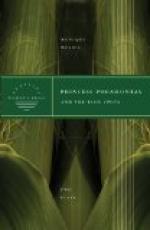“We be thy friends, Captain, and thy wellwishers. We came to this strange land to make our fortunes because of thy coming. We felt safe with one who had already travelled far and knew all about the outlandish ways of queer folks, blackamoors and these red men here. Now if so be thou art not to have a voice in the managing we be cheated and know not what may befall us. There be many of the others who think as we do, not only laborers such as we, but many of the gentlemen who have little faith in them as have been set in the high places. Now I say to thee, let us three go amongst them we knows as are friendly to thee and we will speak in secret with them and we will draw together to-morrow at one end of this island, and there we will all stay until they agree to make thee President. And if fightin’ comes o’ it why all the better. What sayst thou, Captain?”
Smith did not answer at once. The friendliness of these men touched him deeply just at the moment when he was smarting under the treatment accorded him. He knew they spoke truth; there were a number of the colonists who had shown themselves friendly to him and who would be willing to stand by him. Moreover, he felt within himself the power to use them, to make them follow his bidding as Wingfield could never succeed in doing. It was less for personal gratification he was tempted to consent than for the knowledge that his leadership would benefit the colony as would that of none of his fellow adventurers. He was not a vain man, but one conscious of unusual powers.
“If we were strong enough to gain and hold part of the stores and one of the vessels, would ye let me lead ye away to some other island of our own, men?” he asked, and immediately saw in his imagination the possibilities of such a step.
“Aye, aye. Captain,” cried all three, “and we’d be strong enough too, never fear,” added Hugh.
The temptation to John Smith was a strong one, and he walked up and down weighing the matter. What consideration after all did he owe to those who had not considered him? He had no fear of failure; he had come safely through too many dangers not to be confident. It was only the first step that he doubted. The men, he could see, were growing impatient, yet he did not speak. Suddenly an arrow whizzed close to his ear and fell at his feet.
“The savages!” cried Dickon.
Smith peered towards the woods beyond the water and imagined he could see half hidden behind a birch tree a naked figure.
“Let us go back and warn the Council,” he said, turning towards the way he had come. “I scarcely think that they will attack us, particularly if we stay together.”
He stood still a moment lost in thought. Then he said:
“That’s the word, Dickon, if we stay together! Nay, frown not, Hugh. Put out of thy mind all that we have spoken of this last half-hour, as I shall put it out of mine. We must stand together, men, here in this new world. Ye three stand by me because we’re all neighbors and Lincolnshire-born; but here in this wilderness we’re all neighbors, English-born, just like a bigger shire. It’s no time now when savages are about us all, to be thinking of our own little troubles. We must e’en forget them and stick together for the good of us all. Will ye promise, men?”




